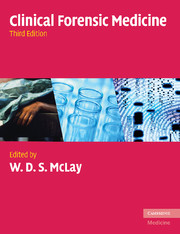Book contents
- Frontmatter
- Contents
- List of contributors
- Preface
- 1 Legal systems: a world view
- 2 Scottish legal system
- 3 The Police in the United Kingdom
- 4 The practitioner's obligations
- 5 The doctor in court
- 6 Custody medicine: physical conditions
- 7 Custody medicine: mental illness and psychological conditions
- 8 Substance misuse
- 9 Alcohol, drugs and driving
- 10 Injury
- 11 Child abuse: physical
- 12 Child abuse: sexual
- 13 Adult sexual offences
- 14 Management of at-risk exposures and infection control in custody
- 15 Scenes of crime
- 16 Forensic science
- 17 Forensic dentistry
- 18 Investigation of death
- 19 Dealing with a major disaster
- 20 Occupational health of police officers
- Index
2 - Scottish legal system
Published online by Cambridge University Press: 12 August 2009
- Frontmatter
- Contents
- List of contributors
- Preface
- 1 Legal systems: a world view
- 2 Scottish legal system
- 3 The Police in the United Kingdom
- 4 The practitioner's obligations
- 5 The doctor in court
- 6 Custody medicine: physical conditions
- 7 Custody medicine: mental illness and psychological conditions
- 8 Substance misuse
- 9 Alcohol, drugs and driving
- 10 Injury
- 11 Child abuse: physical
- 12 Child abuse: sexual
- 13 Adult sexual offences
- 14 Management of at-risk exposures and infection control in custody
- 15 Scenes of crime
- 16 Forensic science
- 17 Forensic dentistry
- 18 Investigation of death
- 19 Dealing with a major disaster
- 20 Occupational health of police officers
- Index
Summary
History
The Treaty of Union of 1707 provided for the retention of a separate system of law in Scotland, particularly where this concerned private rights. The extent to which the Roman-Dutch element in Scots law has persisted since, despite the loss of legislative understanding at Westminster, is a tribute to the strength of a system based on principle rather than on precedent, which inspires Anglo-Saxon common law. Not only is Roman law influence still felt, it remains entirely competent to appeal to the ancient institutional writers' statements of valid law when apparent gaps are identified during a case. When a civil litigant appeals to the House of Lords as the highest civil appeal court (no such appeal is competent in criminal cases) the case is heard on the basis of Scots law. Since 1876 there has been at least one Law Lord from the Scottish Bench. This appeal function will be transferred to the proposed UK Supreme Court when the Constitutional Reform Act 2005 comes into effect.
Corroboration has long been a supremely important principle but, in civil cases, facts can now be provided by evidence from a single source. Hearsay evidence is competent, though not desirable (Civil Evidence (Scotland) Act 1988). In the criminal sphere, with a few statutory exceptions, an accused may not be convicted on the testimony of a single witness, but corroboration is not required if the accused can be shown to have ‘special knowledge’ of a crime, that is to say, cannot have known details unless they themselves perpetrated the crime.
- Type
- Chapter
- Information
- Clinical Forensic Medicine , pp. 19 - 28Publisher: Cambridge University PressPrint publication year: 2009



